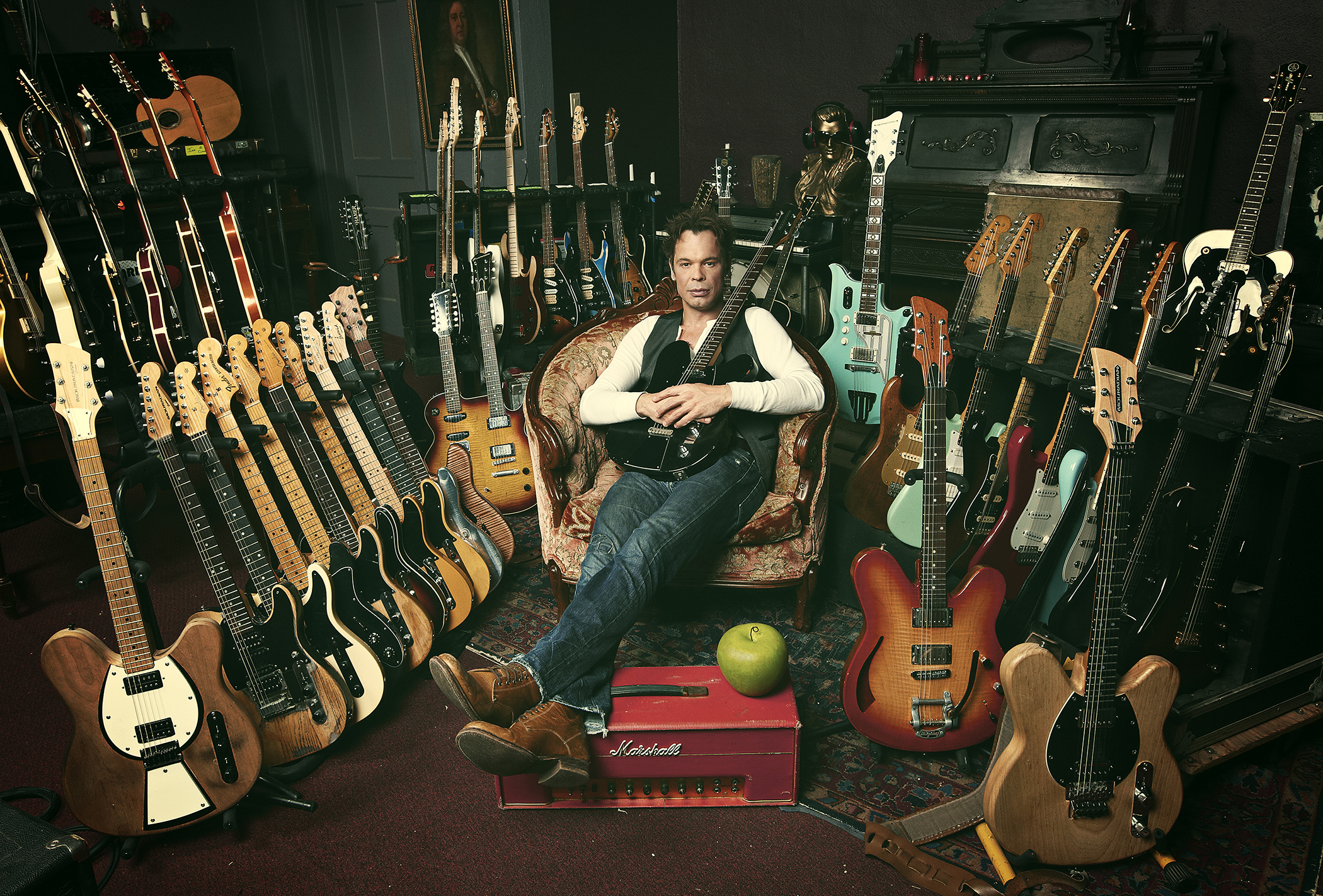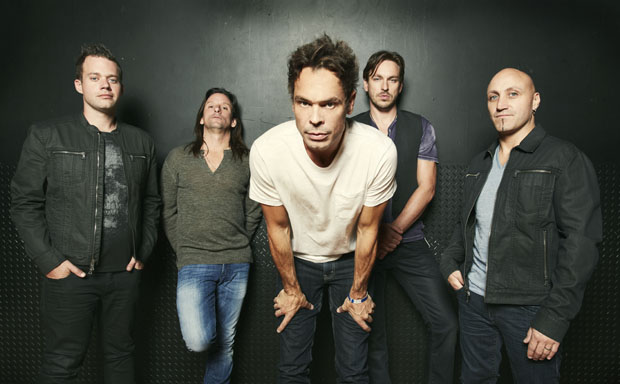Interview: Vocalist/Guitarist Ian Thornley Discusses Auditioning for Velvet Revolver and Reuniting with Big Wreck

He had a shot at fronting Velvet Revolver, the rock supergroup featuring former Guns N' Roses members Slash, Duff McKagan and Matt Sorum.
But Ian Thornley balked when the band's manager asked if he'd consider putting down the guitar and just singing.
"I guess I could've tried," he says, "I had a great time with them and they're all genuinely good dudes, but grabbing a tambourine and dancing around just isn't natural to me." He laughs and says, "I guess I've always thought of myself as more of a Keith than a Mick."
While the combo of Thornley's rapturous vocals and Slash's salacious style of play would've made for some beautiful black-hearted blues, Big Wreck fans are happy it never happened. More than a decade after that band's last album, Thornley and Big Wreck co-founder Brian Doherty have reunited for the release of Albatross, an electrifying album of gut-crunching rock and roll.
Co-produced by Thornley and Eric Ratz (Billy Talent, Cancer Bats) and executive-produced by Nick Raskulinecz (Foo Fighters, Rush, Alice In Chains), Albatross was released in Canada earlier this year and debuted at No. 5 on SoundScan’s Top 200 Album Chart. The album, which is due for a U.S. release on February 19, 2013, owes its early success to its blistering lead single/title track, which held the No. 1 spot on the Canadian rock radio charts for six weeks.
"There's definitely a sweet vindication to hitting No. 1," Thornley says. "But it was more important to me to make an album we could be proud of — and we did. The fact that other people are reacting positively to it is just gravy."
Big Wreck formed in Boston in the early mid-'90s after Thornley and Doherty met as students at the Berklee College of Music. After several years of gigging around the area, the band signed a deal and released debut album In Loving Memory Of… in 1997. The album spawned a top 10 hit ("The Oaf") and drew critical praise, but the band called it a day just a few years later.
Get The Pick Newsletter
All the latest guitar news, interviews, lessons, reviews, deals and more, direct to your inbox!
[[ Download "Albatross" by Big Wreck here, or use the widget below! ]]
Citing outside pressures and a major label machine whose parts were no longer in sync, they parted ways after 2001’s sophomore album, The Pleasure and the Greed. And while Thornley had a successful solo career, he missed making music with his friend.
"We're a couple of guitar nerds at heart," Thornley says. "We get off on the same stuff. He reinforces everything I love about guitar-driven music. And when you listen to this record, you can hear how much fun we had making it."
GUITAR WORLD: Let's go back to the first reunited gig with Brian. Was it weird to look across the stage and see him there?
It was weird only because it wasn't weird. We were playing in Edmonton. It was the second or third song and I look over and there's Brian rocking out and I was like, "yeah, OK" and I kept playing. And suddenly I thought, "Wait, that should feel weird, y'know?" But it wasn't. It was really natural and easy.
And playing the old stuff again — how does that feel?
I can easily put myself in the same mindset I was when I wrote and recorded those songs, as opposed to just relying on muscle memory and going, "Oh yeah, we go to an E flat there." I find myself smack dab in the middle of where I was when I was having those original thoughts and feelings. As corny and cliched as that may sound.
How do you think you've changed as a guitarist and vocalist since those early days?
We were actually talking about this the other day. We were doing an older song at soundcheck and the way that I used to sing the chorus to this particular song isn't something I do anymore because it was reckless and stupid. I would just lean on my throat as hard I could just to get a particular sound out of it, knowing that I might not be able to finish the show. I also never used to warm up my voice. I'm playing better now than I ever did and that's because I'm practicing all the time. Same thing with my vocals. It's actually easier to get through a night than it used to be. I'd like to think I've learned a lot more and matured.
How often do you practice?
If I have the time, I'll sit there and play for eight hours. Sometimes my hands get a little tired but I do practice every day.
Do you have a particular routine?
I like to get my hands in sync and I go through different string patterns. You can feel when they're both warmed up and then you put 'em together. As you get older, it requires a little more to get 'em going. Sometimes I have to use a metronome to gauge where my hands are at, and then it's like, "OK, I'm ready, let's hit the stage."
We were looking at that publicity photo of you surrounded by a wall of guitars. Which is your most prized possession?
They all are, really. I'm not really a collector, per se. All the guitars that I own serve a purpose tonally or esthetically. I have a '65 Strat that I've had for a long time that wasn't even original when I acquired it. It's been re-fretted a bunch of times and I've tried different pickups — that's been my main guitar through the years. Then there's the Mouradian Flapjacks — I have four but don't have proper cases for them. They're too large and can only fit in acoustic guitar cases, so we have to pack the case with towels and all kinds of stuff. Then when you go on the road and they get banged around and when you pull 'em out, the neck is out of whack and the whole thing's disjointed. I don't want that to happen anymore, so I leave those at home.

So if, God forbid, there was a fire and you could save only one ...
[Laughs] Oh, don't do that to me, man. You're gonna give me nightmares. Right now, I'd have to say the '65 Strat. There's just too much of my DNA in that one.
So that was your primary guitar on Albatross?
Not really. There are a lot of "Strat sounds" on the album, but a lot of those come from the Petrucci Music Man. I have a few of those and really do love them. I know that might seem weird because our music is so different from Dream Theater, but he's really got all the sounds figured out. That said, there were more than a few Strats laying around when we needed the real authentic old school sound. And of course, all the Flapjacks were out and they provided a lot of the meat on the record. A buddy also loaned me a Brazilian board R9 Gibson reissue that I used on a couple of things. Basically we used whatever was going to achieve the sound that we thought the songs needed.
And amps?
We had four different versions of Fender Pro Juniors going at different levels of gain and sometimes we'd put something in front of it to blow it up. They're fantastic little guys with a unique voice. We also used the Matchless DC-30. And then when we needed big sound, we pulled out Soldanos, Bogners or Marshalls. But we did a lot with smaller amps.
Songwriting-wise, you've talked about the track "Albatross" and how you've been fooling around with the basic idea for awhile. What made it finally click?
That main melody has been around for many years. Some of the ideas on this record have been kicking around since before the first Big Wreck album. That little descending line that opens the tune, that riff has been around for so long. I couldn't even put a date on it, but I've tried everything with that one. I've stapled it to the end of other tunes and that didn't work. I tried it as a bridge for another song and that didn't work, either. But I loved that little melody, I just never imagined it as the focal point of a song. It's just a matter of perspective. Sometimes it takes ten years for a song to write itself in five minutes.
Do you remember seeing a particular show as a kid that made you say, "That's what I wanna do"?
Bruce Springsteen on his "Born in the USA" tour. My dad took my brother and me, and we had to bring binoculars because we were so far away. I must've been about 10 years old and it blew me away. There was nothing like it. His connection to the audience and just the entire vibe — the stories between the songs — all of it. And Springsteen's still doing that. He's the real deal.
And how soon after that did you get your first guitar and what was it?
I had been playing piano since age 5, but I didn't start playing guitar until I was like 16 or 17. My first guitar was a crappy little acoustic that sat in my closet for a year. Then I befriended a guy who was a great guitar player. And I was really into Zeppelin at the time and he started showing me how to play some of the songs, and I was like, "Dude! It's that easy?" [laughs]. Once I felt that connection of "You put your fingers here and do this with your hand and then you can sound like that thing coming out of the speakers," it was over. The seed was planted.
And now years later, you're not comfortable singing without a guitar in your hands, which you've talked about in regards to Velvet Revolver.
It's just not me. Slash is a great guy and way more down to earth and authentic than you would ever think of someone of his stature — the whole band is, really. There was a great musical connection. But it's not what they were looking for and not what I want to do. And I think Slash got that. I'm not one to bust out a dance move. And I've got nothing against guys who do that. Scott Weiland is a great frontman — totally captivating. But for me, it's all about singing songs with a guitar. I've just always been that guy.
“This particular way of concluding Bohemian Rhapsody will be hard to beat!” Brian May with Benson Boone, Green Day with the Go-Gos, and Lady Gaga rocking a Suhr – Coachella’s first weekend delivered the guitar goods
“I was writing songs from eight years old, but once I got a guitar I began to deeply identify with music… building an arsenal of influences”: How Lea Thomas uses guitars her dad built to conjure a magic synthesis of folk, pop and the ethereal










